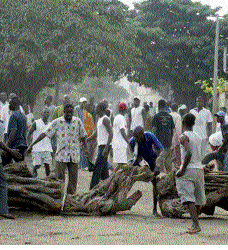


Posted by By Christian Ita with agency reports on



Togo drifted dangerously towards anarchy yesterday when its army opened fire on anti-government protesters in Lome, killing two persons.
Togo drifted dangerously towards anarchy yesterday when its army opened fire on anti-government protesters in Lome, killing two persons.
This has sparked a mass exodus of Nigerians from the country as they fear they could become targets of government-sponsored attacks following President Olusegun Obasanjo's refusal to recognize the new government in that country.
Togo, with a population of over 5 million has a sizeable number of Nigerians. Reports said the fleeing Nigerians were using bush paths to avoid the numerous roadblocks mounted by the country's military.
Fears nursed by Nigerians resident in Togo ostensibly stem from the experience their compatriots in Liberia who were deliberately hunted and killed by the then rebel group, the National Patriotic Front of Liberia (NPFL) led by Charles Taylor following Nigerian government's support under General Ibrahim Babangida for the then government of President Samuel Doe.
The height of NPFL's bad blood against Nigerians was the brutal murder of two Nigerian Journalists, Tayo Awotusin and Krees Imodibie, by Taylor's men.
In Lome yesterday, the two casualities were reportedly felled by shots fired by the country's army when they clashed with over 2000 demonstrators who were carrying banners with such inscriptions as "Togo is not a monarchy" and "The coup d'etat will not succeed."
But the government is denying claims that the army deliberately killed the victims.
The country's interior minister, Francois Boko said the soldiers where brought in to disperse the protesters who had surrounded their vehicle in the neighborhood of Be, an opposition stronghold.
The minister who spoke with a foreign news agency claimed "the military fired warning shots which unfortunately hit two people."
Nigeria, which Thursday recalled its ambassador from the country, said it was closely observing events in the country.
A statement from the Foreign Affairs Ministry said the Federal Government viewed with great concern the unfolding political situation in neighbouring Togo.
Meanwhile, the Economic Community of West African States (ECOWAS) yesterday demanded that the Togoles government should render an unqualified apology to President Olusegun Obasanjo and the people of Nigeria for refusing entry to the president's advance team Thursday.
The West African organisation handed down the demand to Togolese officials who met with its officials in Niamey, the capital of Niger Republic.
Aware of the danger its actions could constitute for its sizeable citizens in Togo, the Nigeria government through the Foreign Affairs Ministry said 'it would hold the Togolese authorities fully responsible for any breakdown of law and order in that country, or any acts of intimidation or harassment visited on any African or non-African resident in Togo as those acts would be deemed hostile and treated as such."
In Nigeria, prominent lawyers and political scientists have, while applauding the Federal Government's actions on the Togolese crisis, warned against unilateral actions.
Chief Gani Fawehinmi while condemning the action of the Togolese government, which he described as illegality, was however of the opinion that 'Nigeria has no moral authority to correct Togo."
He said 'President Obasanjo came to power by rigging and this was confirmed by the Court of Appeal. Obasanjo has flouted the constitution of Nigeria several times and should have been impeached a long time ago. As such he does not have the moral right to correct Togo."
But President of Ohanaeze Ndigbo, Professor Joe Irukwu said he was impressed with the reaction of the international community to the crisis in Togo.
Insisting that Africans must find away to stop illegal governments, Irukwu contended that 'I don't think anybody can fault Nigeria and the Economic Community of West African States (ECOWAS) over steps so far taken.
Another lawyer, Festus Keyamo urged the international community to isolate Togo, stating that 'the Togo precedent is dangerous for West Africa in particular and Africa as a whole."
He said if possible, force could be used to restore constitutionality in that country but warned that such should be done under the umbrella of the African Union or ECOWAS

